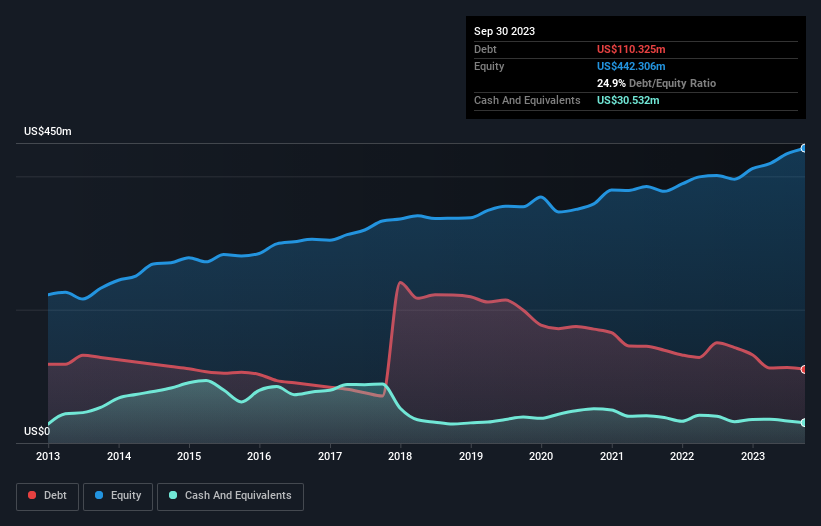Warren Buffett famously said, 'Volatility is far from synonymous with risk.' It's only natural to consider a company's balance sheet when you examine how risky it is, since debt is often involved when a business collapses. We can see that Thermon Group Holdings, Inc. (NYSE:THR) does use debt in its business. But the real question is whether this debt is making the company risky.
Why Does Debt Bring Risk?
Debt assists a business until the business has trouble paying it off, either with new capital or with free cash flow. Part and parcel of capitalism is the process of 'creative destruction' where failed businesses are mercilessly liquidated by their bankers. However, a more common (but still painful) scenario is that it has to raise new equity capital at a low price, thus permanently diluting shareholders. Having said that, the most common situation is where a company manages its debt reasonably well - and to its own advantage. When we examine debt levels, we first consider both cash and debt levels, together.
See our latest analysis for Thermon Group Holdings
What Is Thermon Group Holdings's Debt?
As you can see below, Thermon Group Holdings had US$110.3m of debt at September 2023, down from US$143.0m a year prior. However, it also had US$30.5m in cash, and so its net debt is US$79.8m.

How Healthy Is Thermon Group Holdings' Balance Sheet?
According to the last reported balance sheet, Thermon Group Holdings had liabilities of US$117.9m due within 12 months, and liabilities of US$103.5m due beyond 12 months. Offsetting these obligations, it had cash of US$30.5m as well as receivables valued at US$129.9m due within 12 months. So its liabilities total US$61.0m more than the combination of its cash and short-term receivables.
Of course, Thermon Group Holdings has a market capitalization of US$1.10b, so these liabilities are probably manageable. But there are sufficient liabilities that we would certainly recommend shareholders continue to monitor the balance sheet, going forward.
We measure a company's debt load relative to its earnings power by looking at its net debt divided by its earnings before interest, tax, depreciation, and amortization (EBITDA) and by calculating how easily its earnings before interest and tax (EBIT) cover its interest expense (interest cover). The advantage of this approach is that we take into account both the absolute quantum of debt (with net debt to EBITDA) and the actual interest expenses associated with that debt (with its interest cover ratio).
Thermon Group Holdings's net debt is only 0.83 times its EBITDA. And its EBIT easily covers its interest expense, being 11.0 times the size. So we're pretty relaxed about its super-conservative use of debt. On top of that, Thermon Group Holdings grew its EBIT by 44% over the last twelve months, and that growth will make it easier to handle its debt. When analysing debt levels, the balance sheet is the obvious place to start. But ultimately the future profitability of the business will decide if Thermon Group Holdings can strengthen its balance sheet over time. So if you're focused on the future you can check out this free report showing analyst profit forecasts.
Finally, a business needs free cash flow to pay off debt; accounting profits just don't cut it. So the logical step is to look at the proportion of that EBIT that is matched by actual free cash flow. Over the most recent three years, Thermon Group Holdings recorded free cash flow worth 56% of its EBIT, which is around normal, given free cash flow excludes interest and tax. This cold hard cash means it can reduce its debt when it wants to.
Our View
Happily, Thermon Group Holdings's impressive EBIT growth rate implies it has the upper hand on its debt. And that's just the beginning of the good news since its interest cover is also very heartening. Zooming out, Thermon Group Holdings seems to use debt quite reasonably; and that gets the nod from us. While debt does bring risk, when used wisely it can also bring a higher return on equity. There's no doubt that we learn most about debt from the balance sheet. But ultimately, every company can contain risks that exist outside of the balance sheet. Be aware that Thermon Group Holdings is showing 1 warning sign in our investment analysis , you should know about...
If, after all that, you're more interested in a fast growing company with a rock-solid balance sheet, then check out our list of net cash growth stocks without delay.
Valuation is complex, but we're here to simplify it.
Discover if Thermon Group Holdings might be undervalued or overvalued with our detailed analysis, featuring fair value estimates, potential risks, dividends, insider trades, and its financial condition.
Access Free AnalysisHave feedback on this article? Concerned about the content? Get in touch with us directly. Alternatively, email editorial-team (at) simplywallst.com.
This article by Simply Wall St is general in nature. We provide commentary based on historical data and analyst forecasts only using an unbiased methodology and our articles are not intended to be financial advice. It does not constitute a recommendation to buy or sell any stock, and does not take account of your objectives, or your financial situation. We aim to bring you long-term focused analysis driven by fundamental data. Note that our analysis may not factor in the latest price-sensitive company announcements or qualitative material. Simply Wall St has no position in any stocks mentioned.
About NYSE:THR
Thermon Group Holdings
Provides engineered industrial process heating solutions for process industries in the United States and Latin America, Canada, Europe, the Middle East, Africa, and the Asia-Pacific.
Flawless balance sheet with proven track record.
Similar Companies
Market Insights
Community Narratives




